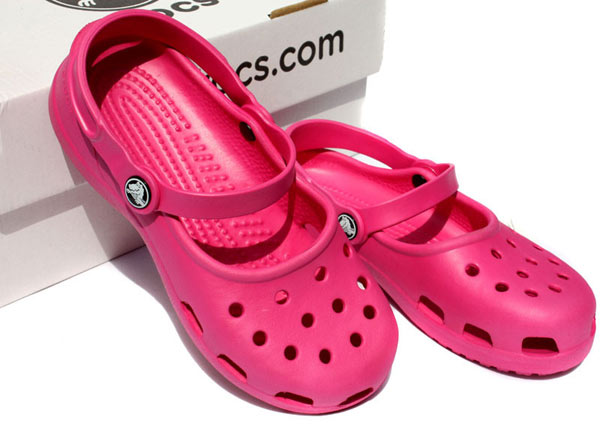當(dāng)前位置: Language Tips> 雙語新聞
Here’s What Podiatrists Think About Your Crocs
分享到

Love them or hate them, Crocs — the rubber clogs that started out in 2002 as boater-floaters for Jimmy Buffett types in Florida but have now sold more than 300 million pairs in 90 countries — are here to stay.
卡洛馳于2002年創(chuàng)建在佛羅里達(dá),當(dāng)時是為劃船運(yùn)動而生產(chǎn)的吉米?巴菲特式的輕便橡膠鞋。而無論你喜歡還是討厭,這些鞋已經(jīng)在90個國家售出了三億多雙——它已經(jīng)扎穩(wěn)了根基。
Treasured for their comfort, rubberiness and floatability, they’re equally popular with toddlers and Mario Batali.
人們喜愛卡洛馳洞洞鞋的舒適、有彈性和輕便,學(xué)步的小孩和馬里奧?巴塔利都很喜歡。
“They are great at the dog park or in the backyard where I am likely to step in something that is very difficult to clean off sneakers but comes off easily with a hose or a wipe from my clogs,” one wearer writes in an Amazon review.
一位用戶在亞馬遜評論里寫道:“在狗公園或后院里穿著它們非常棒,在那些地方我很有可能踩上什么東西,如果穿運(yùn)動鞋就很難洗掉,但是用軟管沖洗或擦拭洞洞鞋就會很容易清理掉。”
Fair.
還算不錯。
“Great protection for toes and great to lounge around. Also great for travel in tropics with aquatic activities,” another says.
“能很好地保護(hù)腳趾,很適合閑逛。去熱帶地區(qū)旅游做水上運(yùn)動也特別好,”另外一個人說。
Good points,all.
觀點(diǎn)很好,確實(shí)。
Crocs are affordable, and at this point, classic ... but what do podiatrists — you know, actual doctors who want you to live your best life — think about them?
洞洞鞋價格實(shí)惠,實(shí)惠的同時又比較經(jīng)典……但是足病醫(yī)生們——你知道那些真正希望你生活得最好的醫(yī)生們,怎么想它們嗎?
They’re not fans — at least not the doctors we spoke with.
他們不是狂熱者——起碼與我們談話的醫(yī)生們不是。
“Unfortunately Crocs are not suitable for all-day use,” Dr. Megan Leahy, a Chicago-based podiatrist with the Illinois Bone and Joint Institute, told HuffPost. While she granted that they “offer nice arch support,” she added that the real reason you shouldn’t wear them over long periods of time is that “these shoes do not adequately secure the heel. When the heel is unstable, toes tend to grip which can lead to tendinitis, worsening of toe deformities, nail problems, corns and calluses. The same thing can happen with flip flops or any backless shoes as the heel is not secured.”
位于芝加哥的伊利諾伊州骨骼和關(guān)節(jié)研究所足病醫(yī)生梅甘?萊西對《赫芬頓郵報》說:“不幸的是,洞洞鞋不適合全天穿著。”但是她承認(rèn)“它們給足弓提供了很好的支撐”,她補(bǔ)充說不應(yīng)長時間穿著的真正原因是這些鞋不能給腳后跟提供足夠的支撐。如果腳后跟不穩(wěn)定,腳趾就會緊緊抓地,可能導(dǎo)致肌腱炎、加劇腳趾變形、指甲異常、雞眼、產(chǎn)生老繭。人字拖或任何形式的拖鞋都會產(chǎn)生同樣的問題,因為腳后跟得不到支撐。
Dr. Alex Kor, the president of the American Academy of Podiatric Sports Medicine, told HuffPost that the most important feature in any shoe is the shank, the supportive structure between the heel and the toe. “Patients are more likely to have foot pain if their shoes bend in the shank,” said Kor.
美國運(yùn)動足病醫(yī)學(xué)學(xué)會主席亞歷克斯?科爾對《赫芬頓郵報》說,任何一雙鞋最重要的特征都是腰鐵,就是腳后跟到腳趾的支撐結(jié)構(gòu)。“如果鞋子在腰鐵處彎曲,病人就更有可能腳痛,”科爾說。
Crocs, according to Kor, “are the ‘poster child’ for shoes with a flexible shank. ... In other words, on a daily basis, I see patients who come into my office complaining of arch or heel pain and they are wearing Crocs,” he said.
據(jù)科爾說,洞洞鞋“是腰鐵易彎曲的‘典型代表’……也就是說,每天,我都能見到來我辦公室抱怨足弓或腳后跟疼痛的病人,他們都穿著洞洞鞋,”他說。
“The only two types of patients that may benefit from wearing Crocs are patients that have a very high arch or those who suffer from excessive edema of their legs and ankle,” Kor said. “But, under no circumstances can I suggest wearing Crocs 8 to 10 hours per day.”
“只有兩種病人也許能從穿洞洞鞋中獲益,一種是足弓特別高的病人,另一種是腿和腳踝過度水腫的病人,”科爾說。“但是,我絕不會建議每天穿洞洞鞋8到10個小時。”
Leahy agreed, telling HuffPost that Crocs are “OK to use for trips to the beach or the pool, but should not be used for long walks. I do notice that children (and even adults) tend to trip and fall more in these shoes.”
萊希也同意這個觀點(diǎn),她對《赫芬頓郵報》說洞洞鞋“可以穿去海灘或游泳池,但不應(yīng)用于長時間行走。我確實(shí)注意到小孩(甚至大人)穿洞洞鞋時摔倒的次數(shù)更多。”
If you’re going to walk out with your Croc out, it’s best to do it in short intervals, lest you take a walk in Florida, where the Croc was born, trip into the marsh and fall into the mouth of a waiting crocodile, thus completing Mother Nature’s circle of life:
如果你要穿著洞洞鞋出去,最好每隔一小段時間休息一下,免得你來卡洛馳的誕生地佛羅里達(dá)時,絆倒在沼澤地,掉進(jìn)等待著的鱷魚的嘴里,由此完成自然母親的生命循環(huán)。
Vocabulary:
floater: 輕便鞋
rubbery: 有彈力的
toddler: 學(xué)步的小孩
lounge: 閑逛
aquatic: 水上的;水生的
edema: 水腫
shank: 腰鐵
英文來源:赫芬頓郵報
翻譯:實(shí)習(xí)生孫美真
編審:yaning
上一篇 : 《權(quán)游》人物星座大起底
下一篇 : 如何成為人見人愛的同事?
分享到
關(guān)注和訂閱


翻譯
關(guān)于我們 | 聯(lián)系方式 | 招聘信息
電話:8610-84883645
傳真:8610-84883500
Email: languagetips@chinadaily.com.cn